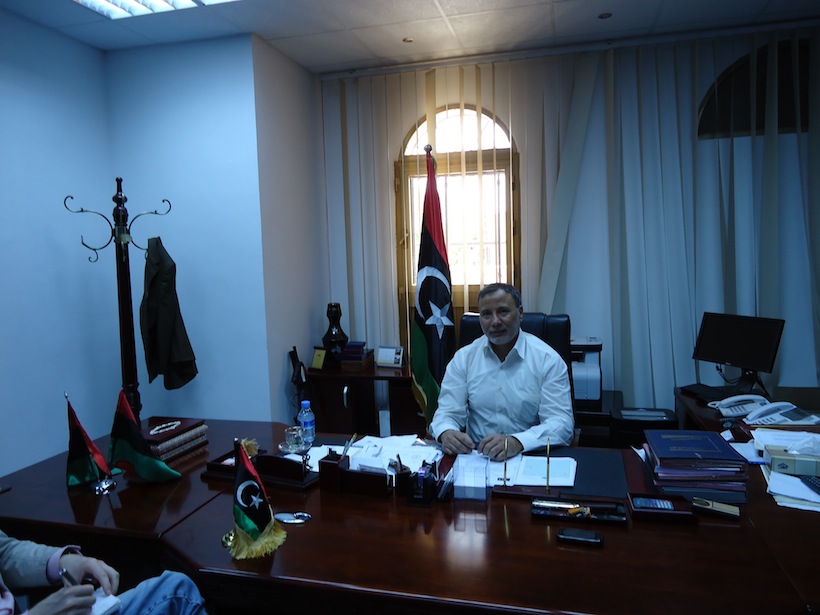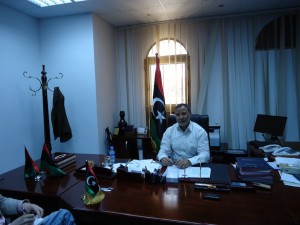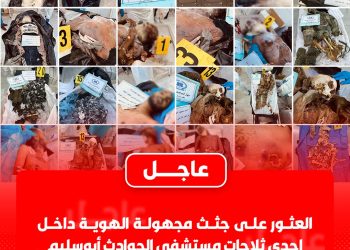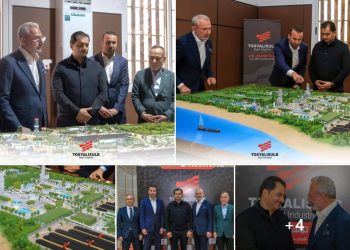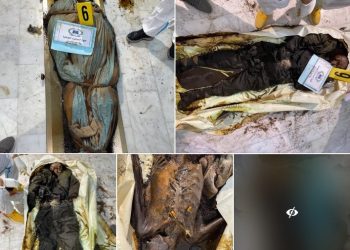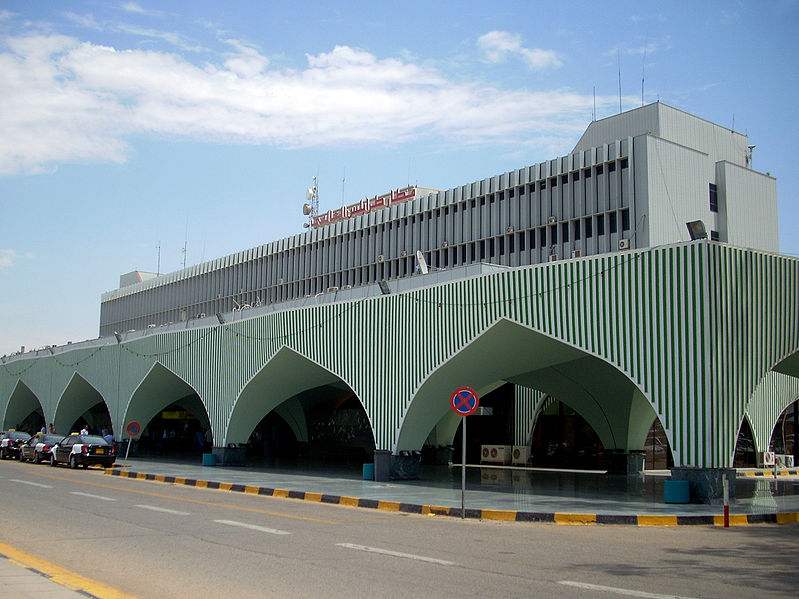By Ashraf Abdul-Wahab
Tripoli, 11 May:
Q ) Minister, can you . . .[restrict]explain to us the plans to dissolve the militias and the formation of the new national army?
A) We started the rebuilding of the national army by creating an action plan.
First, we started to dissolve the units of all the previous security forces. Qaddafi’s regime was different from those of the rest of the world. He didn’t have a system of brigades and battalions like other armies of the world. He had special forces controlled by a system under the leadership of his sons.
We identified certain assembly centers for these dissolved forces. We appointed a gathering point close to their place of residence and set up committees at every gathering point. Their task is to make special lists of all personnel assigned to that particular assembly point in order to facilitate payments of their salaries.
We are also collecting information through incriminating documents and rebels’ testimony in respect of crimes during the revolution. Those accused of such crimes will be excluded and referred to the military prosecutor.
The next stage will be to re-instate these forces according to fields of specialization and thus ensure the proper formation of newly specialized forces. We’ll supply them with all necessary help and support, provide them with supplies and have already re-implemented all training and maintenance contracts.
In respect of the thuwar, we’ve announced that we will be accepting all revolutionaries wanting to join the army and we are currently running 32 recruitment centres. But first they must be physically fit and enlisted with one of the thuwar battalions.
Our plan is to accommodate as many of them as possible in order to secure our borders and oil plants. Since the thuwar are present in very large numbers, they will be initially given training together and then divided into groups for further training. There are also set plans to establish military tribunals and armed formations. These groups will be given their direct orders from the Ministry of Defence.
Q ) How long will it take to implement these plans?
A) It is difficult to say accurately because it will depend on several factors. We were hoping to finish forming the army before the elections, but there are many obstacles.
Q ) What is the expected size of the army, taking into consideration the old army and the newly joined rebels?
A) Former soldiers will make up around 70 percent of the new army and the plan was to include 25,000 of the revolutionaries.
Q) What is the expected size of the new national army?
A ) The expected number is estimated at 100,000 which is a big number. The size issue is still be dealt with; we cannot abandon anyone right now, but we plan to reduce this number in the future.
Q) Do you think NATO strikes made extensive damages to military installations which will need large sums of money to rebuild?
A) Of course, because Qaddafi had very large stockpiles of weapons, and thus it was necessary to destroy all his arsenal. But despite the intensive strikes by NATO, a very large number of weapons remains intact.
Q ) What is the exact remaining quantity of weapons?
A ) This question couldn’t be answered even by Qaddafi himself nor can it be answered by the weapon suppliers because he had been stockpiling weapons for a very long time. We came across weapons of no use to us in Libya — there are thousands and thousands of each type, perhaps all types of weapons manufactured in the world.
Q ) Do you think smuggling weapons out of Libya will end?
A) Smuggling weapons is a worldwide issue and taking into consideration current conditions, it will most certainly continue.
Q ) In some neighboring countries, the situation has changed because of weapons being smuggled out of Libya. What is your personal opinion about that?
A ) Conditions change because of circumstances. However, the reasons are not just about weapons but people. Many left Libya. In the case of Tuareg of Mali, there were large numbers of them in Libya. But when the regime collapsed, they left Libya and went to Mali with loads of guns. However, the situation was ripe for such an event — and it was not the first time.
Q ) Don’t you think that some former troops will form groups within the national army that might have a regional impact?
A ) I have explained to you, we allocated to them several centres throughout Libya. We then assigned each individual according to his specialization so that each and every centre will cover a variety of disciplines and every centre will include different combinations of individuals from all over the country.
Q) Do you think that Libya will import weapons and military equipment, such as military aircraft, ships and the like from NATO countries?
A ) Certainly. The NATO countries are strong and well developed in the military field and in all areas and thus are a basic choice for re-arming the Libyan army. However, we will exclude no-one including Russia. It all depends on the needs of our army, its capabilities and the prices — as well as a number of other factors.
Q ) Do you think that Saif Al-Islam will remain in Zintan for a long time?
A) First of all, Zintan is part of Libya, so whether he is tried in Zintan, Misrata, Tobruq or Tripoli or anywhere else in Libya, it’s all the same.
Q) Then you are saying that the important thing is to have his trial in Libya but that the location of the trial is not important.
A ) Of course, because his crimes were committed against the Libyan people.
Q ) Many leading figures are demanding the transfer of Saif Al-Islam to Tripoli. Do you agree with them, or do you think we should wait until the elections for the National Congress are over?
A) There is no justification for that. Many trials have not been held in capitals but in other cities and they were famous trials in history.
Q ) We see that many military councils are still working, in Tripoli, Misrata and the eastern region. What kind of cooperation do you have with them?
A ) There is cooperation with many military councils in respect of many issues — the supervision of prisoners and providing them with food and all necessary supplies and allowing access to them. There is also coordination on other things.
In the past whenever there was disorder, they took action, but now they only move by direct orders from the Ministry of Defense and they follow a specific method. Of course, there isn’t 100-percent discipline, but there are improvements every day because they are grasping at the concept of legitimacy.
Q) Will Libya try to stop the phenomenon of weapon smuggling or try to stop anyone who tries to help the Syrian rebels. Most Libyans sympathize with the suffering of the Syrian people. It is well known there were weapons smuggled to Syria one way or the other.
A) I, personally, am of the opinion that the Syrian people should be supported because of their tragic situation, but assistance must be channeled through organized ways so that nobody gets harmed and that arms don’t fall into the wrong hands.
Q) Russia has said that the smuggling of weapons from Libya to Syria violates international laws and treaties.
A ) We have not captured any smuggled shipments of weapons from Libya.
Q ) If there were proof of weapons being smuggled out of Libya, what would be the position of Libya?
A ) Of course, this would reflect badly on us, but only if the smuggling was conducted with the approval of the government or the government’s knowledge. If, however, if people were just sympathetic to Syria, this is a different matter altogether.
Q ) We see strong indications of public sympathy for Syria. What do you think of that?
A) Of course, this can happen, because we went through the experience which the Syrian people are going through now – of bloodshed and they did not receive the same sympathy from the world as we did in Libya because of their different circumstances; everyone sympathizes with the Syrians. You yourself must be sympathizing with them because people are being killed
Q ) Do you think that the killing of Major General Abdel-Fattah Younis may affect the security and stability of Libya?
A) No, I do not think so; however the killing of Major General Abdel-Fattah Younis was a decisive blow in respect of the reshaping of the national army and caused a rift in the army, but it will not affect the stability of Libya, because in the end, the matter was looked upon as tribal.
Q) Do you think that the solution of the murder of Abdel-Fattah Younis lies within the tribes rather than in a court of law?
A) No, because courts are decisive. The killers have not been identified yet, but if they are identified and they belong to a certain tribe, then that particular tribe can solve the problem; however, if the killers turned out to be people who are united
by ideology, it would be difficult to find a tribal solution. If the murderer and the victim were of different tribes, with personal disputes this can be solved by the tribes but if the killer belongs to a group and has a certain ideology, then this can only be resolved through the courts.
Q) Do you want to be a Defence Minister in the next government? Or do you have other political aspirations?
A) As for being Minister for Defence, I think I have had enough.
Q ) What do you think of the political direction of Libya at present?
A) Libya at present is going through a very serious and sensitive time; if elections pass peacefully and a transitional government is formed, then the future of Libya will be stable and democratic. The next stage of the National Congress elections will be very crucial.
Q ) Are you comfortable with Libya’s current political situation?
A) Yes, but I have some concerns.
Q) Do you think that one of the reasons behind the seriousness of the situation is the proliferation of weapons?
A) Yes, definitely – if a new government is elected, people will feel reassured and will give up their weapons.
Q ) Shouldn’t you have called upon the rebels to hand over their weapons in return for a financial grant which was the cause of many problems?
A ) This should have been requested right from the start; I did not issue the decision. It decision was issued on 9 August 2011.
Q) Mr. Minister, we heard last week that you were a victim of an attempted assassination in Kufra. Is that true?
A ) No, there was no assassination attempt. There was only a reminder of earlier days when you heard guns being fired nearby.
Q) We have been hearing of incidents and bombings in some places. Do you think that this will have an effect on the stability of these places?
A ) Things will get better, but some of the problems we have in Libya because the limit of expectations of the Libyan citizens are very high, people do not appreciate the accumulated problems of the past and expect to have everything solved within months. The real problem is identifying the problem which is in itself a major problem.
Q ) Who is the biggest enemy at this stage – Qaddafi’s supporters or terrorism?
A) Our worst enemy is ignorance, the lack of knowledge of one’s expectations because the Libyan citizen does not have political experience. We Libyans have no political experience and that is why we expected that once Qaddafi had fallen, things would be good and construction would begin and new buildings would be erected and salaries would be high. These kind of unrealistic expectations are the problem.
[/restrict]


